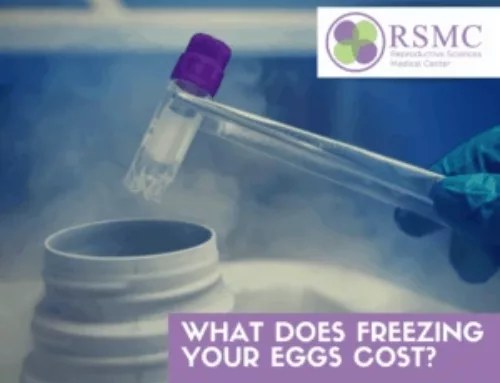Egg Freezing is on the Rise
Egg freezing, also known as oocyte cryopreservation, is a procedure that preserves a woman’s eggs. Using this technique, a woman can postpone becoming pregnant without egg of reduced quality. More and more women are opting to store their eggs for later use because it gives them control over their reproduction timeline. RSMC – San Diego & Irvine brings you insight of the egg freezing process & it’s popularity.
Why is Egg Freezing preferred?
Human egg freezing is going mainstream and the biggest reason behind it is, it works. Many studies suggest that the success rate of women getting pregnant through in-vitro fertilization (IVF) is the same with both fresh and frozen eggs. These results have increased the control and flexibility that women can have in their reproduction and their careers.
IVF and egg freezing are quite similar, in fact, the only difference between them is the timing of pregnancy. In both, a woman takes fertility shots in order to boost her egg production and then has them extracted. In any IVF procedure, the fresh eggs are immediately combined with sperm in a laboratory. The resulting embryos are implanted in the recipient’s womb so that pregnancy can begin immediately. In the egg freezing process, the woman’s eggs are frozen to use for pregnancy at a later date. In both procedures, egg implantation occurs the same way.
Time & Effort
Like IVF, egg freezing takes a lot of time and effort. To elaborate, egg retrieval and freezing takes four to five weeks. There are also some additional costs along with thawing, fertilizing and implanting the eggs years later. The whole process of freezing eggs can cost over $12,000.
Despite the hefty price of the process, women are still choosing to the treatment. That’s because as women become older, the quality of their eggs decrease. This gives women the incentive to freeze their eggs in order to preserve their fertility. Freezing eggs at a younger age also helps increase pregnancy success rates at a later age. In short, women use freezing process as a safety net for when they are ready to become pregnant.
On the other hand, men produce new sperm cells throughout their lives,. Whereas women are born with all the eggs they’ll ever have. They will lose one egg with each period, so over time, the quality of their remaining eggs declines and are more likely to have genetic abnormalities. For example, 50% of a 30-year-old women’s eggs are chromosomally normal but by the age of 44, it drops to as low as 2%, according to Jami Grifo, the co-director of Oocyte Cryopreservation Program in New York. Grifo strongly recommends that women who wish to proceed with the process should do so before the age of 38.
The Origin of the Process
The origin of this procedure dates back to the 1980’s for women with cancer. It was developed to preserve the eggs of women before losing their fertility from chemotherapy. In late 2012, the American Society of Reproductive Medicine declared that egg freezing was no longer experimental. Since then, Reproductive Sciences Medical Center – San Diego & Irvine has worked with thousands of patients, with a large portion choosing egg freezing.
Facebook, Apple and some other companies also contributed towards the buzz about egg freezing by announcing that they will pay for employee’s elective egg freezing procedures. Most insurance providers cover infertility treatments but only a few cover the high price of elective freezing.
The process of egg freezing involves several trips to the clinic, days of fertility shots, slight discomfort and emotional duress that accompanies fertility treatments. But after this, a woman can have her frozen eggs as insurance and will hopefully be able to conceive years later at her own time. One unfortunate uncertainty about egg freezing is that, there is no guarantee that these women will become pregnant. It can be quite heart breaking for women who face trouble with becoming pregnant or cannot carry the baby to term. Luckily, this is not as common as one might fear. With advancing technologies in the fertility industry, the pregnancy success rates continue to improve.
What is the Egg Freezing Process?
If you’re considering freezing your eggs, you can expect the process to be as outlined as below.
-
Initial Consultation
-
-
- The very first step towards the process is visiting an IVF clinic or agency for a consultation.
- Meet the doctors, nurses and financial counselor to discuss a fertility plan, medication and a financial strategy
-
Cycle Evaluation
- Before starting medication, you might need to wait up to 21 days, depending on the current stage of your menstrual cycle.
- If you have been on birth control pills for more than 5 years, then you will have to stop taking them a couple of months before the egg freezing process starts. It will be better to take birth control pills to suppress egg production, a week or two before fertility shots begin.
-
Ovarian Stimulation
- This phase will take 10 to 14 days, and you will have to take one to three daily hormone injections to enable your body to produce as many viable eggs as possible.
- On an average, 6 doctors’ visits are vital to monitor progress with blood tests and ultrasounds.
- Cramps, weight gain, pain at injection site and headaches are possible side effects of the ovarian stimulation process. These side effects are similar to a typically menstrual cycle.
-
Trigger Shot
- Patients receive this shot precisely 1.5 days before egg retrieval.
- It is the final hormone medication that triggers the eggs to mature and so they are ready for the extraction.
-
Egg Retrieval
- The procedure is fairly short and approximately takes 20 minutes. Your physician will recommend at least an hour for recovery.
- During this procedure you will undergo light sedation. The doctor will use a transvaginal ultrasound to guide him or her as he or she conducts the retrieval.
- Bloating, cramping and fatigue are common side effects that you may experience.
- At a typical retrieval, it is possible to harvest/retrieve 12 to 20 eggs in each cycle.
-
Freezing
- Medical professionals evaluate each retrieved egg before proceeding.
- A process called vitrification removes liquid from the healthy eggs.
- Eggs are then loaded in cryo-vials and placed into liquid nitrogen to freeze them within seconds.
- At RSMC – San Diego & Irvine, we store the eggs onsite of egg freezing to eliminate any risks associated with transportation.
-
If you’re interested in freezing your eggs, please don’t hesitate to contact us at 858-436-7186 or email at info@fertile.com or schedule a consultation here.























